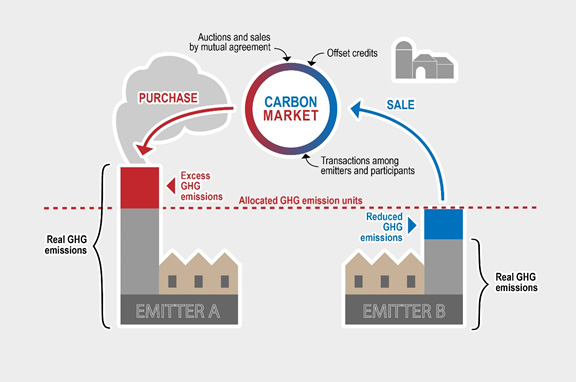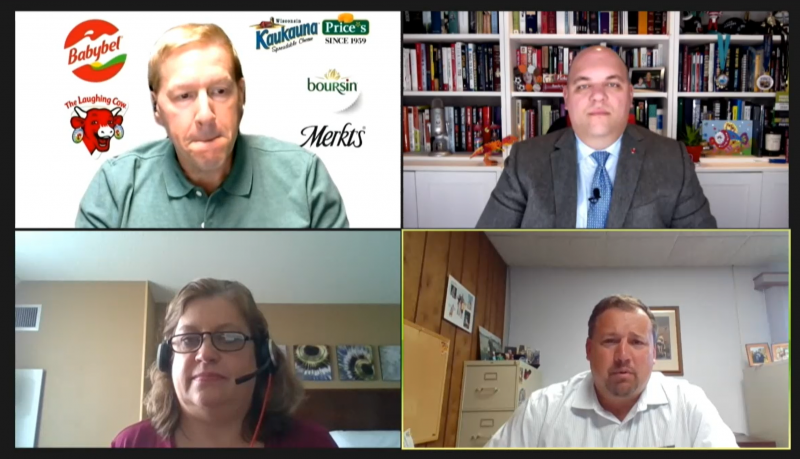Sharing Dairy’s Sustainability Story
by: Ashley Warren, Sustainability & Communications Coordinator
What does sustainability mean to you? This question has always been hard for me to answer. I know what you are thinking, “Ashley, it’s your own words. There are no wrong answers!” But sometimes the meaning changes for me. It also has a different meaning for each person.
Last month I had the opportunity to tune into the Dairy Experience Forum put on by Midwest Dairy. This event packed a lot of information into a virtual, one day event. One of the sessions was a panel discussing environmental solutions. Our very own, Bob Huffman, was one of the panelists representing processors. The other two panelists included Minnesota dairy farmer, Suzanne Vold, and Director of Milk Sourcing and Dairy Sustainability at Bel Brands USA, Brain Zook. Each of these individuals answered this question in a very different way.
Vold: “Leaving it better than when we came,”
Huffman: “It’s in the spirit of doing what is right,” and
Zook: “Corporately aligning greenhouse gas (GHG) emission targets.”
Our goal as a dairy industry is to become carbon neutral by the year 2050. We have been making steps to reduce our carbon footprint for a while now. Some of the actions we have already implemented at the plant include: using energy efficient lighting in our facilities, in 2019 we reused 185 million gallons of cow water (water separated from the milk we receive) to wash equipment and heating and cooling pipes. We were also able to recycle 99% of our total waste in 2019.

By being a collective industry, or one place emitting less than the allocated emissions than the other, is a promising way for the dairy industry to become carbon neutral by 2050.
Image: https://climatechange.lta.org/carbon-markets-natl-policies/
How do we know these numbers you ask? Documentation. All three panelists agreed that having data is key to helping share dairy’s sustainable message. But this doesn’t just stop at the plant level.
Something new we have incorporated, and are asking our farmers to take part in, is FARM’s Environmental Stewardship assessment which consists of a questionnaire to collect data on what the dairy industry’s environmental footprint is. Electricity, milk production, manure management and feed production are the main sets of questions on the module.
Vold commented how farmers are classified as humble people, but what we don’t do well is share our stories of what we are doing on the farm.
“As farmers we sometimes have been called humble, sometimes we are called stubborn. We don’t do a great job of sharing what we are doing on our operations, mainly because we are independent operators and that’s what makes us good farmers. But we need to tell our story.”
Earlier in the webinar was a consumer panel, and the big takeaway from the panel was consumers simply just don’t know how their food is made and where it comes from. In today’s world, the average person is at least four generations removed from agriculture. Vold also commented on how each farm is different – different size, different geographical locations, different practices, different cooperatives and products their milk goes to. This is why it is so important to tell others what we are doing on our farms. But we need the numbers to do it.
“Within our role from farm to table, it’s a really easy decision for First District to sign on and adopt the U.S. Dairy Stewardship Commitment,” Huffman said. “For us, that reinforces our commitment and our role to building a sustainable future, and what we demonstrate with that commitment to our customers and ultimately our consumers.”

Top to bottom, from L to R: Brain Zook, Bel Brands, Andy Vance, moderator, Suzanne Vold, dairy farmer, Bob Huffman, CEO FDA
Zook commented on how the alliance has allowed brands to align the message of being sustainably produced, rather than each customer having their own set of standards and messages. As a cooperative who sells to many different customers, the alliance is a great route for our customers to take advantage of so we can send the same message across; we are responsibly producing great dairy foods. The alliance sets the minimum tone or standard of what consumers are looking and asking for to bring a product into their home.
When Huffman was asked if the dairy industry was ready to tell their sustainability stories he replied with, “I think we are definitely up to the challenge, but I think we all need to do more to be up to that challenge.”
Suzanne commented that we need to share more information and tell our stories, but there is an overwhelming amount of information out there. It can be hard to decide what can be trusted and what can’t be. She said our job is to be transparent.
“We need to be clear, but we need to be concise. And we need the help of our cooperatives and our retail brands to do that because we as dairy farmers can’t do it all.”
Our customers want to know the environmental impact our farmers have. That is why we have incorporated the FARM ES module, to help collect that data to tell our stories. Vold serves as a member of the Innovation Center for Dairy Environmental Stewardship Committee and reassured farmers the data collected on their farm is totally confidential.
“I want to assure farmers that if you’re asked to participate in FARM environmental stewardship, please feel confident your data privacy will be protected,” she said. “That is something our committee and industry takes very seriously. We look at the data as an industry basis, not as an individual farm basis.”
She also encouraged farmers to take part in this assessment when given the opportunity.
“When you’re asked to do the FARM environmental stewardship survey, please participate because the more data we have, the better we can do as an industry of showing what a great job we are already doing in being sustainable,” Vold said. “There’s more work to be done, no doubt about it, but we are already doing some amazing and wonderful things.”
I always tell our consumers and our farmers that they have been doing all these things for generations – doing the best things possible for their operation, all while thinking about the environment and well-being of their animals. But we need the data to back up these statements.
So, what does sustainability mean to you? How have you been sustainable in your practices? How can you help be a voice to tell our sustainability story?
To learn more about the FARM Environmental Stewardship module, visit https://nationaldairyfarm.com/dairy-farm-standards/environmental-stewardship/